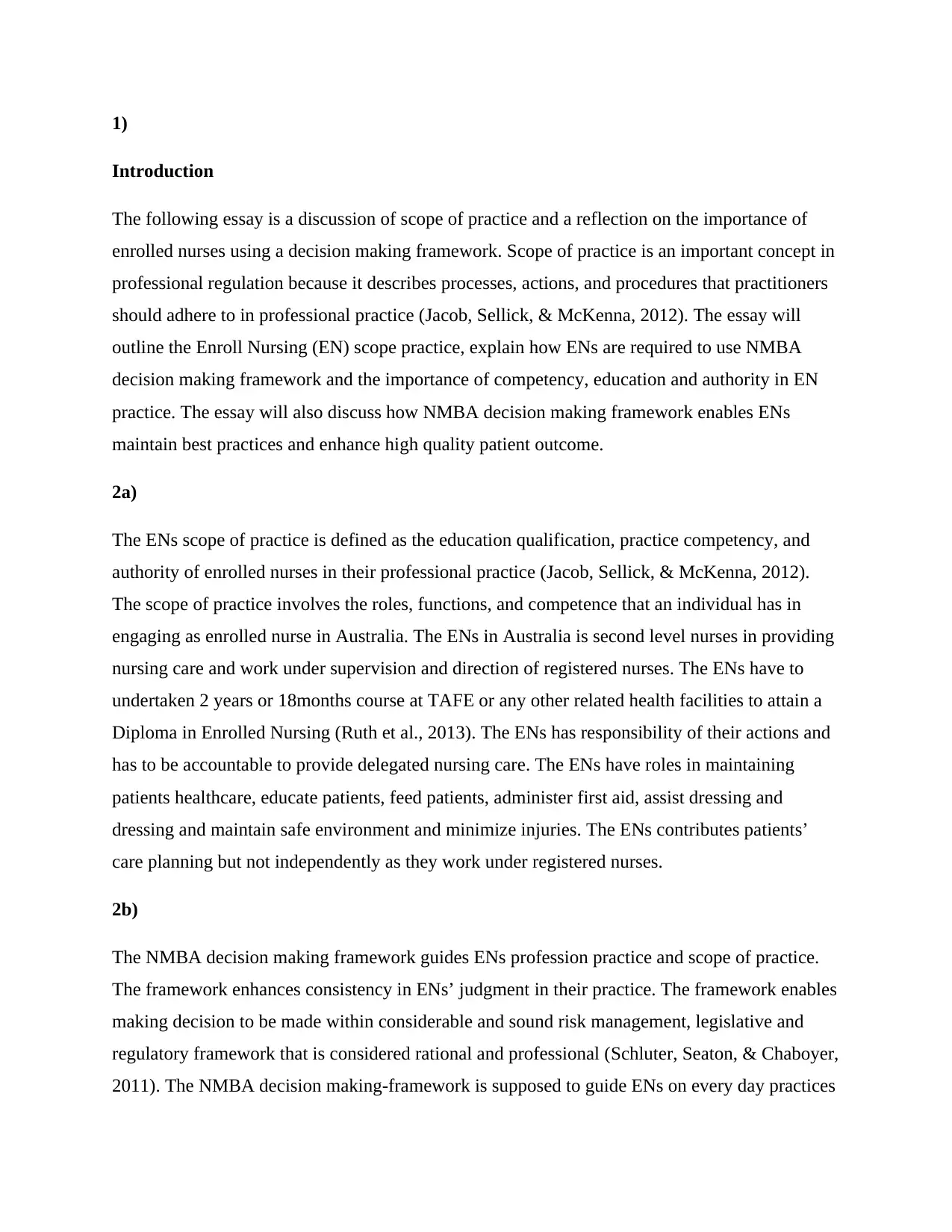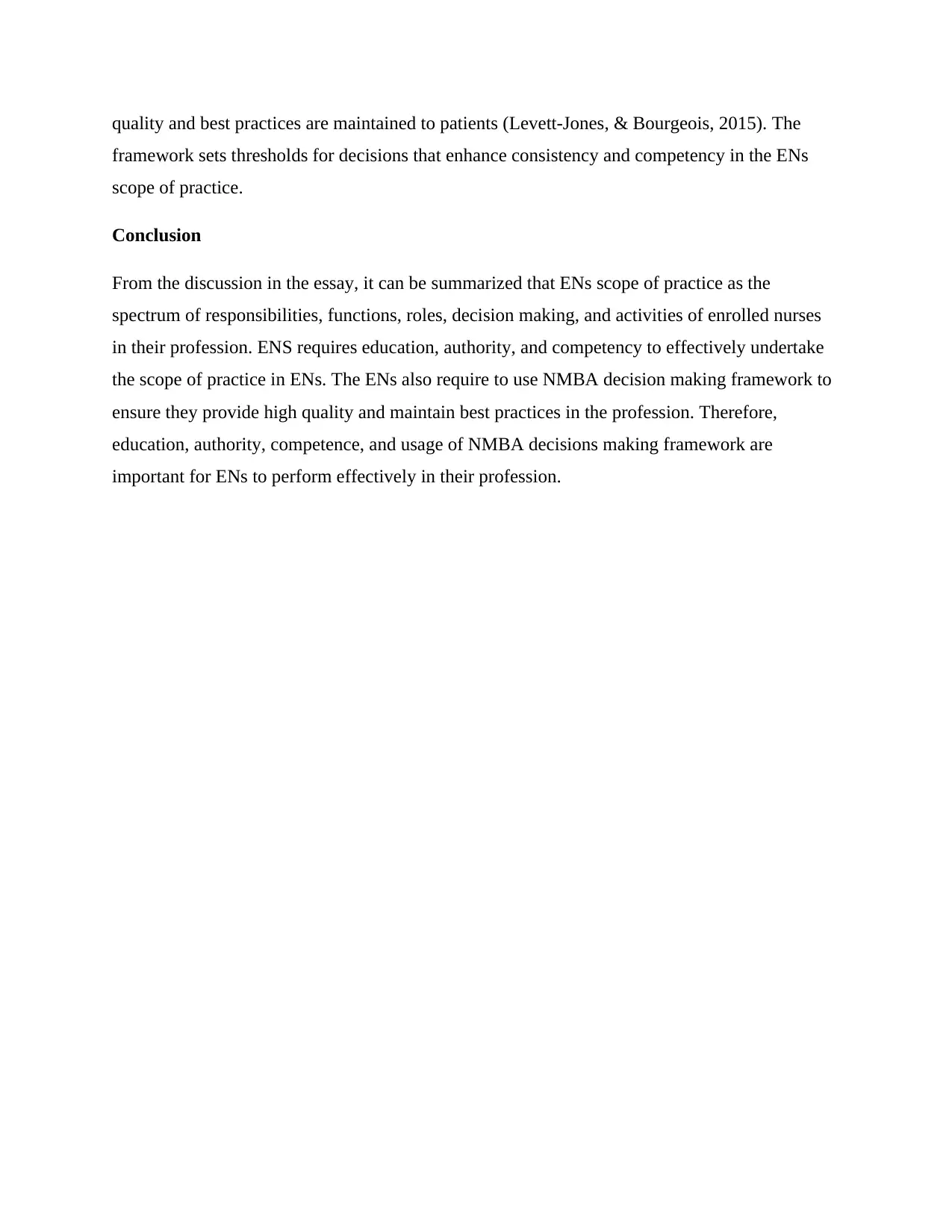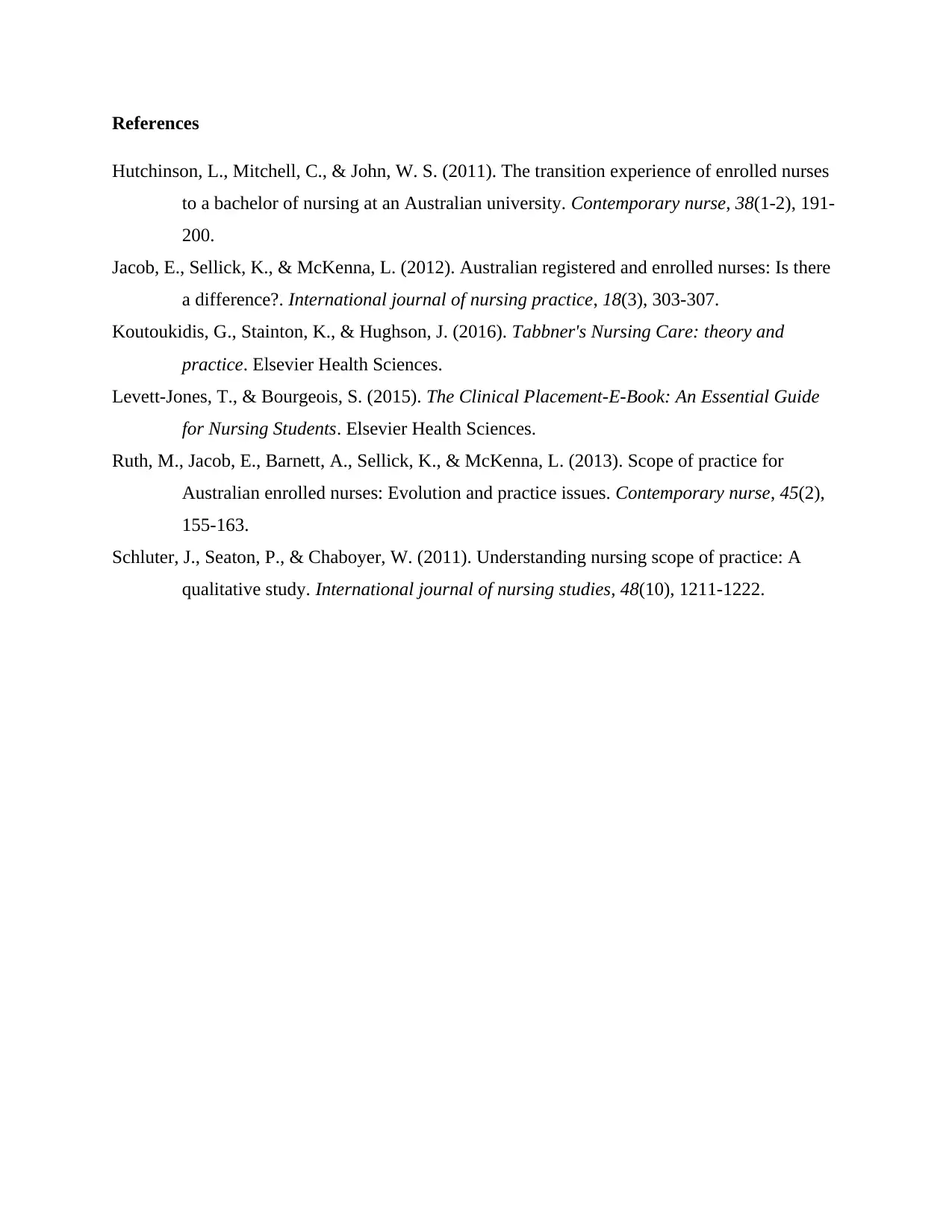Enrolled Nursing Scope of Practice and Decision Making
VerifiedAdded on 2020/04/21
|5
|1159
|58
AI Summary
This assignment explores the scope of practice for enrolled nurses (ENs) in Australia, highlighting their roles, responsibilities, and the importance of adhering to the NMBA decision-making framework. It emphasizes the significance of education, authority, and competency in EN practice, demonstrating how these factors contribute to delivering high-quality patient care and maintaining best practices.
Contribute Materials
Your contribution can guide someone’s learning journey. Share your
documents today.

UNIT:
NAME:
DATE:
NAME:
DATE:
Secure Best Marks with AI Grader
Need help grading? Try our AI Grader for instant feedback on your assignments.

1)
Introduction
The following essay is a discussion of scope of practice and a reflection on the importance of
enrolled nurses using a decision making framework. Scope of practice is an important concept in
professional regulation because it describes processes, actions, and procedures that practitioners
should adhere to in professional practice (Jacob, Sellick, & McKenna, 2012). The essay will
outline the Enroll Nursing (EN) scope practice, explain how ENs are required to use NMBA
decision making framework and the importance of competency, education and authority in EN
practice. The essay will also discuss how NMBA decision making framework enables ENs
maintain best practices and enhance high quality patient outcome.
2a)
The ENs scope of practice is defined as the education qualification, practice competency, and
authority of enrolled nurses in their professional practice (Jacob, Sellick, & McKenna, 2012).
The scope of practice involves the roles, functions, and competence that an individual has in
engaging as enrolled nurse in Australia. The ENs in Australia is second level nurses in providing
nursing care and work under supervision and direction of registered nurses. The ENs have to
undertaken 2 years or 18months course at TAFE or any other related health facilities to attain a
Diploma in Enrolled Nursing (Ruth et al., 2013). The ENs has responsibility of their actions and
has to be accountable to provide delegated nursing care. The ENs have roles in maintaining
patients healthcare, educate patients, feed patients, administer first aid, assist dressing and
dressing and maintain safe environment and minimize injuries. The ENs contributes patients’
care planning but not independently as they work under registered nurses.
2b)
The NMBA decision making framework guides ENs profession practice and scope of practice.
The framework enhances consistency in ENs’ judgment in their practice. The framework enables
making decision to be made within considerable and sound risk management, legislative and
regulatory framework that is considered rational and professional (Schluter, Seaton, & Chaboyer,
2011). The NMBA decision making-framework is supposed to guide ENs on every day practices
Introduction
The following essay is a discussion of scope of practice and a reflection on the importance of
enrolled nurses using a decision making framework. Scope of practice is an important concept in
professional regulation because it describes processes, actions, and procedures that practitioners
should adhere to in professional practice (Jacob, Sellick, & McKenna, 2012). The essay will
outline the Enroll Nursing (EN) scope practice, explain how ENs are required to use NMBA
decision making framework and the importance of competency, education and authority in EN
practice. The essay will also discuss how NMBA decision making framework enables ENs
maintain best practices and enhance high quality patient outcome.
2a)
The ENs scope of practice is defined as the education qualification, practice competency, and
authority of enrolled nurses in their professional practice (Jacob, Sellick, & McKenna, 2012).
The scope of practice involves the roles, functions, and competence that an individual has in
engaging as enrolled nurse in Australia. The ENs in Australia is second level nurses in providing
nursing care and work under supervision and direction of registered nurses. The ENs have to
undertaken 2 years or 18months course at TAFE or any other related health facilities to attain a
Diploma in Enrolled Nursing (Ruth et al., 2013). The ENs has responsibility of their actions and
has to be accountable to provide delegated nursing care. The ENs have roles in maintaining
patients healthcare, educate patients, feed patients, administer first aid, assist dressing and
dressing and maintain safe environment and minimize injuries. The ENs contributes patients’
care planning but not independently as they work under registered nurses.
2b)
The NMBA decision making framework guides ENs profession practice and scope of practice.
The framework enhances consistency in ENs’ judgment in their practice. The framework enables
making decision to be made within considerable and sound risk management, legislative and
regulatory framework that is considered rational and professional (Schluter, Seaton, & Chaboyer,
2011). The NMBA decision making-framework is supposed to guide ENs on every day practices

to be done competently and confidently. The framework creates a basis for decision making that
give reference for the actions that ENs undertake in their daily practice. Secondly, NMBA
decision making framework is supposed to guide how new practices are introduced by ENs
safely and orderly. This minimizes the risks likely to be in the process of introducing a new
practice or service in the ENs scope of practice (Koutoukidis, Stainton, & Hughson, 2016).
Another guide of the NMBA decision framework is delegations of decisions to enhance safety.
ENs work under registered nurses and it importance for the framework to guide on the delegation
of decisions to ensure responsibility of decisions is separated.
2c)
Authority, education, and competence are important to enabling ENs functions, roles,
responsibilities, decisions making and activities. Education is the most important base of
knowledge for enrolled nurses. Education gives recognized qualifications of an individual to
practice EN. It is through education that an individual is equipped with enrolling nursing skills
and knowledge that are essential in practicing EN. Authority is important to delegating decisions.
Authority enables ENs understand and undertake what is within their scope of practice as they
operate under RNs delegation or supervision. This enhances responsibility and accountability in
the workplace. Competence is an important aspect in ENs practice as it enables effectiveness in
performance in their profession. Competence refers to combination of skills, knowledge, values,
attitudes, and abilities that enable ENs to undertake their duty effective (Hutchinson, Mitchell, &
John, 2011).
2d)
NMBA decision making framework is important in helping ENS maintain high quality and best
practices outcome to patient. The framework enables ENs make considerations and self
assessment when determining their practices in their profession. The ENs is able to make
decisions that are within sound risk management. This reduces the risk and enhances safety when
making decisions. Secondly, the NMBA decision making framework is important to ENs
maintaining best practices through adherence to legislative and regulation framework. This
ensures that ENs put public interest first leading to high quality patients’ outcome. The NMBA
decisions making framework is also important in enhancing professionalism that ensure high
give reference for the actions that ENs undertake in their daily practice. Secondly, NMBA
decision making framework is supposed to guide how new practices are introduced by ENs
safely and orderly. This minimizes the risks likely to be in the process of introducing a new
practice or service in the ENs scope of practice (Koutoukidis, Stainton, & Hughson, 2016).
Another guide of the NMBA decision framework is delegations of decisions to enhance safety.
ENs work under registered nurses and it importance for the framework to guide on the delegation
of decisions to ensure responsibility of decisions is separated.
2c)
Authority, education, and competence are important to enabling ENs functions, roles,
responsibilities, decisions making and activities. Education is the most important base of
knowledge for enrolled nurses. Education gives recognized qualifications of an individual to
practice EN. It is through education that an individual is equipped with enrolling nursing skills
and knowledge that are essential in practicing EN. Authority is important to delegating decisions.
Authority enables ENs understand and undertake what is within their scope of practice as they
operate under RNs delegation or supervision. This enhances responsibility and accountability in
the workplace. Competence is an important aspect in ENs practice as it enables effectiveness in
performance in their profession. Competence refers to combination of skills, knowledge, values,
attitudes, and abilities that enable ENs to undertake their duty effective (Hutchinson, Mitchell, &
John, 2011).
2d)
NMBA decision making framework is important in helping ENS maintain high quality and best
practices outcome to patient. The framework enables ENs make considerations and self
assessment when determining their practices in their profession. The ENs is able to make
decisions that are within sound risk management. This reduces the risk and enhances safety when
making decisions. Secondly, the NMBA decision making framework is important to ENs
maintaining best practices through adherence to legislative and regulation framework. This
ensures that ENs put public interest first leading to high quality patients’ outcome. The NMBA
decisions making framework is also important in enhancing professionalism that ensure high

quality and best practices are maintained to patients (Levett-Jones, & Bourgeois, 2015). The
framework sets thresholds for decisions that enhance consistency and competency in the ENs
scope of practice.
Conclusion
From the discussion in the essay, it can be summarized that ENs scope of practice as the
spectrum of responsibilities, functions, roles, decision making, and activities of enrolled nurses
in their profession. ENS requires education, authority, and competency to effectively undertake
the scope of practice in ENs. The ENs also require to use NMBA decision making framework to
ensure they provide high quality and maintain best practices in the profession. Therefore,
education, authority, competence, and usage of NMBA decisions making framework are
important for ENs to perform effectively in their profession.
framework sets thresholds for decisions that enhance consistency and competency in the ENs
scope of practice.
Conclusion
From the discussion in the essay, it can be summarized that ENs scope of practice as the
spectrum of responsibilities, functions, roles, decision making, and activities of enrolled nurses
in their profession. ENS requires education, authority, and competency to effectively undertake
the scope of practice in ENs. The ENs also require to use NMBA decision making framework to
ensure they provide high quality and maintain best practices in the profession. Therefore,
education, authority, competence, and usage of NMBA decisions making framework are
important for ENs to perform effectively in their profession.
Secure Best Marks with AI Grader
Need help grading? Try our AI Grader for instant feedback on your assignments.

References
Hutchinson, L., Mitchell, C., & John, W. S. (2011). The transition experience of enrolled nurses
to a bachelor of nursing at an Australian university. Contemporary nurse, 38(1-2), 191-
200.
Jacob, E., Sellick, K., & McKenna, L. (2012). Australian registered and enrolled nurses: Is there
a difference?. International journal of nursing practice, 18(3), 303-307.
Koutoukidis, G., Stainton, K., & Hughson, J. (2016). Tabbner's Nursing Care: theory and
practice. Elsevier Health Sciences.
Levett-Jones, T., & Bourgeois, S. (2015). The Clinical Placement-E-Book: An Essential Guide
for Nursing Students. Elsevier Health Sciences.
Ruth, M., Jacob, E., Barnett, A., Sellick, K., & McKenna, L. (2013). Scope of practice for
Australian enrolled nurses: Evolution and practice issues. Contemporary nurse, 45(2),
155-163.
Schluter, J., Seaton, P., & Chaboyer, W. (2011). Understanding nursing scope of practice: A
qualitative study. International journal of nursing studies, 48(10), 1211-1222.
Hutchinson, L., Mitchell, C., & John, W. S. (2011). The transition experience of enrolled nurses
to a bachelor of nursing at an Australian university. Contemporary nurse, 38(1-2), 191-
200.
Jacob, E., Sellick, K., & McKenna, L. (2012). Australian registered and enrolled nurses: Is there
a difference?. International journal of nursing practice, 18(3), 303-307.
Koutoukidis, G., Stainton, K., & Hughson, J. (2016). Tabbner's Nursing Care: theory and
practice. Elsevier Health Sciences.
Levett-Jones, T., & Bourgeois, S. (2015). The Clinical Placement-E-Book: An Essential Guide
for Nursing Students. Elsevier Health Sciences.
Ruth, M., Jacob, E., Barnett, A., Sellick, K., & McKenna, L. (2013). Scope of practice for
Australian enrolled nurses: Evolution and practice issues. Contemporary nurse, 45(2),
155-163.
Schluter, J., Seaton, P., & Chaboyer, W. (2011). Understanding nursing scope of practice: A
qualitative study. International journal of nursing studies, 48(10), 1211-1222.
1 out of 5
Related Documents
Your All-in-One AI-Powered Toolkit for Academic Success.
+13062052269
info@desklib.com
Available 24*7 on WhatsApp / Email
![[object Object]](/_next/static/media/star-bottom.7253800d.svg)
Unlock your academic potential
© 2024 | Zucol Services PVT LTD | All rights reserved.





